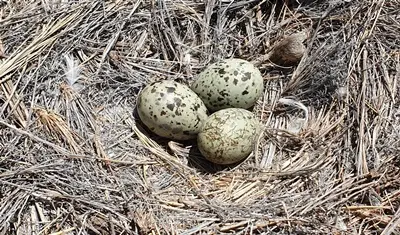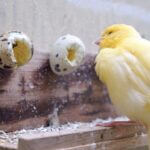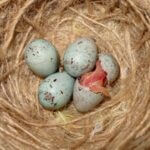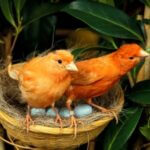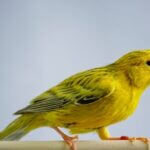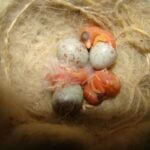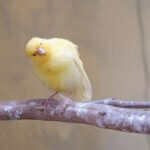If you’re breeding canaries, you may have a clutch that won’t hatch. This can be confusing, especially if you’ve provided the ideal conditions for healthy mating and successful brooding.
Sometimes, the eggs won’t hatch because something is wrong with the male or female canary. A problem may have developed before the eggs were even laid. In other cases, viable eggs are produced yet die during incubation, resulting in a clutch of eggs that’ll never hatch.
Narrowing down the cause lets you understand what adjustments to make for the canary parents, their nest, and the overall brooding conditions.
Why Canary Eggs Don’t Hatch
Canaries are difficult breeders, requiring ideal conditions to mate, lay eggs, brood, and raise offspring. So, it’s frustrating when you encourage mating and see the eggs laid, yet they don’t hatch after incubation.
The most common reasons why canary eggs don’t hatch include:
No Mating Has Occurred
Usually, infertile eggs are caused by the absence of mating. Female canaries, like most birds, will lay a clutch of eggs without a male, provided the right environmental conditions are met.
Of course, if there’s no male to mate with or the mating process isn’t successful (no fertilization has occurred), the eggs won’t hatch.
Infertility
For the egg to hatch, it must be fertile, which requires a male and female canary to mate. However, if the male or female is infertile, the eggs they produce won’t be viable. The causes of infertility include:
Nutritional Deficiencies
Breeding canaries require a balanced diet to supply the nutrients they need to produce viable eggs.
According to Approaches in Poultry, Dairy & Veterinary Sciences, vitamin E plays an important role in female egg formation and sperm motility in males. Breeding canaries deficient in this vitamin are more likely to produce low-quality eggs that may not hatch.
Canaries need calcium for their chicks’ skeletal formation and eggshell formation. Current Ornithology found that 98% of the total mass of bird eggshells is calcium carbonite. This calcium compound forms a sturdy and waterproof shell, containing all the nutrients an embryo needs during incubation.
Breeding females with low calcium levels (hypocalcemia) are likelier to lay soft-shelled, poor-quality eggs. These won’t survive incubation and hatch and may result in egg binding.
Illness
Canaries must be in good physical condition to produce viable, healthy eggs. If the male or female is sick, they’re more likely to be infertile.
This happens due to strain on their bodies, vitamin and mineral deficiencies, and stress. Even if the pair successfully breeds, their sperm or egg development may be stunted, resulting in unviable eggs.
If you discover that your canary’s eggs are often infertile, have both canaries examined by a vet.
Environmental Factors
Exposure to high temperatures can reduce sperm motility in male canaries, thus preventing fertilization, even if they mate. So, maintain a temperature of 70 degrees Fahrenheit during the breeding season.
The positioning of perches can influence whether fertilization occurs during mating. If the perches aren’t stable enough to hold the weight of your birds, the chances of successful copulation will be reduced.
Embryo Mortality
Embryo mortality refers to the embryo’s premature death, which happens between fertilization and hatching. In most cases, embryo mortality in birds happens 3 days after the egg has been fertilized or within the last 3 days before hatching. This may be caused by:
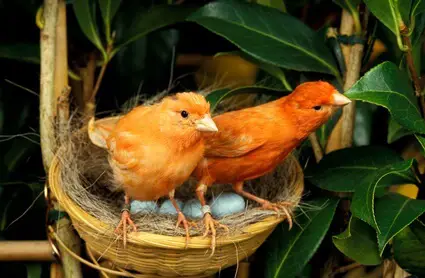
Bacterial or Viral Infections
Canary embryos are susceptible to infections in their early stages of development, which may cause premature death before they’re ready to hatch.
The risk is significantly heightened if the eggs are incubated in unsanitary conditions. For this reason, maintain good hygiene levels in your canaries’ habitat throughout the breeding season.
For instance, avoid handling the eggs with your bare hands and always remove any dead or infertile eggs from the nest, as this will prevent them from spreading pathogens to other viable eggs.
High Calcium Levels
As mentioned, calcium is an important mineral for breeding canaries, as it facilitates the formation of the eggshell. This protects the developing embryo from trauma and prevents the entry of pathogens.
However, if the calcium levels are too high (hypercalcemia), the eggshell might become too hard and impenetrable. This makes it difficult for a chick to break out of the shell.
Vigorous Movements
Throughout the incubation period, canary embryos are vulnerable. Any vigorous shaking or vibration can cause damage to embryonic organs and kill the developing chick. Even if the chick manages to hatch, it’s at risk of developing a disability that’ll significantly lower its quality of life.
Poor Environmental Conditions
Canary embryos require warm environmental temperatures to develop healthily.
In most cases, warmth from the brooding mother is enough to sustain the developing embryos. However, if you’re placing eggs in an incubator, keep the temperature at 98-100 degrees Fahrenheit.
Any significant drops or increases in temperature can interrupt the incubation process, leading to the death of the developing chicks.
Maintain humidity levels at 60-80 percent in your canary’s incubator to improve hatchability. When a canary egg loses too much water, the membrane can stick to the shell’s inner walls, preventing the embryo from freeing itself and resulting in death.
Maintaining high humidity levels provides the embryo with flexibility inside the shell and minimizes the risk of dehydration, which can be fatal.
Poor Incubation
Fertile canary eggs usually hatch at about 14 days from the start of the incubation process. However, for this to happen, they must be incubated properly.
If your mother canary fails to incubate the eggs properly (perhaps due to disturbances in the nest, inexperience, illness, or stress), the embryos are unlikely to develop.
What Is the Incubation Period for Canary Eggs?
Of course, new canary breeders may mistakenly think their canaries’ eggs aren’t going to hatch just because they’re taking longer than expected.
So, it’s useful to know the typical incubation period for a canary egg, so you can understand when to be patient and when to begin looking for problems.
Canary eggs hatch 2-3 weeks after incubation starts. Incubation refers to the process of a bird’s egg developing an embryo inside it and the multiple stages of growth it needs to complete before finally hatching as a chick.
Like most bird species, the incubation process for canaries requires favorable environmental conditions to succeed. Normally, these conditions are achieved through brooding.
Canary eggs usually hatch 14 days after the mother sits on them. However, this period can be longer if the female doesn’t sit on the eggs regularly, which slows their developmental stages.
What To Do If Canary Eggs Don’t Hatch?
If you’ve experienced a failed clutch, you’ll feel disappointed. However, there are ways to prevent more failed clutches and safeguard future eggs:
Fertility
Infertility is a common reason for failed eggs in canaries. So, check that the eggs in the canary’s nest are fertile and viable. To do so, shine a flashlight on them, as eggs that are fertile will:
- Appear translucent (infertile eggs tend to be yellow)
- Have veins
- Produce subtle movement
All infertile eggs should be removed from the nest, so they can’t rot and damage other viable eggs.
If all the eggs are non-viable, removing them may encourage the female to begin the mating process again. This is acceptable if she’s on a balanced diet and can replace lost nutrients.
Ensure your male and female canaries mate, or the eggs won’t be fertilized and will fail to hatch. Often, the position of the perch affects the angle at which the male mounts the female, making fertilization difficult. So, ensure the perch isn’t too high up, or there won’t be enough room.
Nutritious Diet
The embryos won’t develop properly if your breeding canaries are deficient in important minerals, such as vitamin E, calcium, and magnesium. They may even die before they hatch.
So, ensure your canaries receive a nutrient rich-diet throughout the breeding period, including seed mixes, soft food, nestling food, and nutritional supplements.
Ideal Conditions for Incubation
Ideal conditions for breeding involve keeping the cage clean, maintaining high humidity levels, and a stress-free environment for the mother to brood properly.
Ensure the parents have adequate food and water so they don’t have to leave the nest to forage. This will ensure the brooding is more consistent, and the eggs will hatch.

